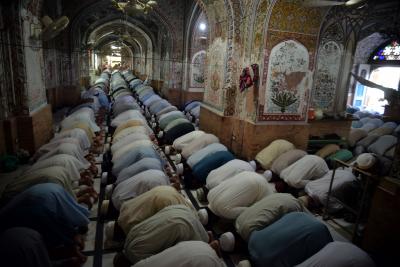Mosques are infection hotspots: Pak doctors
By IANS | Published: April 26, 2020 10:13 AM2020-04-26T10:13:50+5:302020-04-26T10:25:12+5:30
The Pakistan Islamic Medical Association (PIMA) has warned that mosques were becoming a major source of transmission for the novel coronavirus after the government ordered their reopening under pressure from clerics for Ramzan.

Mosques are infection hotspots: Pak doctors
Islamabad, April 26 The Pakistan Islamic Medical Association (PIMA) has warned that mosques were becoming a major source of transmission for the novel coronavirus after the government ordered their reopening under pressure from clerics for Ramzan.
"Mosques are becoming a major source of virus transmission," Efe news quoted PIMA President Iftikhar Burney as saying at a press conference on Saturday.
The doctor said that the end of the health crisis was still a long way off and that the number of infections had doubled in the last six days reaching 12,657 cases and 265 deaths so far.
"At present, more than 200 medical staff, including 100 doctors, have tested coronavirus positive," he added
Under pressure from powerful clerics, Prime Minister Imran Khan decided to lift the ban that had been in place for weeks on collective prayers in religious places.
The lockdown of schools and most businesses remained in place.
The opening of the religious centres has been conditional on complying with a series of security measures, such as the faithful keeping a metre of distance between each other, carrying their own prayer mats and washing at home.
But Burney warned that smart lockdowns do not work in places like Pakistan: "We will not be able to keep people inside their homes under a smart lockdown for a longer period of time."
The doctor said stricter measures were needed to contain the spread of the coronavirus.
So far, the Sindh province has defied the government's decision to reopen mosques and announced that it will keep them closed during Ramzan.
PIMA is not the only healthcare organization to oppose the measure.
"There is no point in opening mosques. I ask people to pray at home and celebrate the end of the daily fast at home," Qaiser Sajjad, secretary-general of the Pakistan Medical Association, told Efe on Friday.
( With inputs from IANS )
Open in app